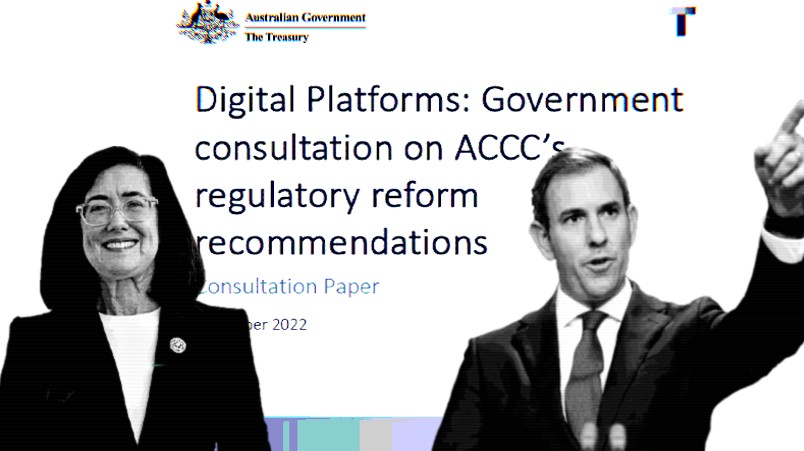Looming tech-giant tantrums? Treasury runs rule over ACCC platform curbs – industry has three weeks to respond

Treasury is running the rule over the ACCC's call for more powers to rein-in big tech. But it has some questions for industry: Will a bigger stick lead to unintended consequences, or can the industry do a better job of fixing its own problems. A quick consultation pushed out before Christmas leaves little time for industry to sway its decision. Final call for submissions is 15 February.
What you need to know
- Consultation paper released on December 20, submissions due February 15
- Reviews the ACCC's proposed approach to regulating digital platform services.
- Asks whether existing protections are enough, as well as the impact of new approaches and regulatory powers.
While you were all sipping those first refreshing holiday daiquiris in the waning twilight of 2022, and tossing up whether TikTok or Insta was the best channel to share your delicious holiday content – and ad budgets – Treasury snuck out an industry consultation paper on regulating those platforms, or not.
Released 20 December, the consultation paper seeks input on the ACCC’s regulatory reform recommendations:
- More regulatory powers to intervene in the market re: unfair trading practices
- Measures to prevent and remove scams, harmful apps and fake reviews
- Mandatory codes for designated digital platforms
- Measures to tackle self-preferencing, whereby platforms use their data advantage to beat rivals to ad dollars.
Submissions are due by February 15. (And if the timing feels a little cynical, maybe have another daiquiri).
In its November 2022 report the ACCC offered a number of proposals to further regulate digital platforms. At the time Treasurer Jim Chalmers noted, "The Albanese Government is already strengthening consumer protections, including through recently introduced legislation to prohibit unfair contract terms and increase penalties for anti-competitive behaviour, and has committed to establish a new National Anti-Scam Centre."
Attempts to regulate digital platforms once again risk potentially raising the ire of technology giants which have bristled at attempts to rein them in in the past. Facebook famously threatened to abandon the country over the News Media Bargaining Code, and at one stage pulled the plug on news services. Wider information services to the community were also effected, something at the time Facebook denied was intentional.
Google made similar threats about its commitment to the Australian market over the same Code developed by former ACCC chair Rod Sims. The fact that his replacement, Gina Cass-Gottlieb had a long association with the Murdoch family which controls News Corp, including a stint as Lachlan Murdoch's personal lawyer, and a director of the trustee administering the Murdoch Family Trust will not have been lost on either company ahead of incoming potential flashpoints.
Since February 2020 the ACCC has been investigating issues around the supply of digital market platform services in areas including;
- Search engine services,
- Social media services,
- Online private messaging services,
- Digital content aggregation platforms,
- Media referral services
- And electronic market place services
It has also looked into digital advertising services supplied by digital platforms and the data practices of both digital platforms and data brokers.
The new consultation paper notes that while the ACCC has articulated the potential advantages of a customised regulatory approach for digital platforms, the adoption of a new customised approach also carries risks for consumers and business, hence the call for submission.
Treasury says a threshold question is whether existing general consumer and competition regulatory frameworks already provide sufficient protection. “All policy alternatives need to be assessed, including voluntary or self-regulatory approaches," per the document.
Treasury also wants to test whether ACCC's proposed approach gets to the real heart of the problems identified in its report – and to examine the enforceability and durability of any regulatory response.
It also focusses on compliance costs for consumers and business, and administrative costs for government.
Lastly, the paper notes that there is a need to investigate the impact of on innovation.
Have your say here.



